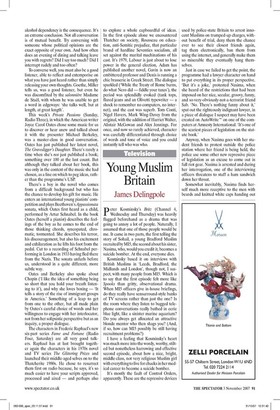Young Muslim Britain
James Delingpole peter Kosminsky's Britz (Channel 4, 1 Wednesday and Thursday) was heavily flagged beforehand as a drama that was going to annoy a lot of people. Naturally, I assumed that one of those people would be me. It came in two parts, the first telling the story of Sohail, a young Bradford Muslim recruited by MI5, the second about his sister, Nasima, who, would you credit it, becomes a suicide bomber. At the end, everyone dies.
Kosminsky based it on interviews with British Muslims in 'Leeds, Bradford, the Midlands and London', though not, I suspect, with many people from MI5. Which is to say that the first episode felt more like Spooks than gritty, observational drama. When MI5 officers give in-house briefings, do they really have sensurround-style banks of TV screens rather than just the one? Is the room where they listen to bugged telephone conversations really bathed in eerie blue light, like a sinister marine aquarium? Do you always get allocated an attractive blonde mentor who then shags you? (And, if so, how can MI5 possibly be still having recruitment problems?) I have a feeling that Kosminsky's heart was much more into the wordy, worthy, stilted but nonetheless harrowing and effective second episode, about how a nice, bright, middle-class, not very religious Muslim girl with everything to live for chucks in her medical career to become a suicide bomber.
It's mostly the fault of Control Orders, apparently. These are the repressive devices used by police-state Britain to arrest innocent Muslims on trumped-up charges, without benefit of trial, deny them the chance ever to see their closest friends again, tag them electronically, ban them from using the internet, and generally make them so miserable they eventually hang themselves.
Just in case we failed to get the point, the programme had a lawyer character on hand to put everything in its proper perspective. 'But it's a joke,' protested Nasima, when she heard of the restrictions that had been imposed on her nice, secular, groovy, funny, and so-very-obviously-not-a-terrorist friend Sab. `No. There's nothing funny about it,' spat out the righteously indignant lawyer, in a piece of dialogue I suspect may have been created on AutoWrite — on one of the computers at Amnesty International. 'It's one of the scariest pieces of legislation on the statute book.'
Anyway, when Nasima goes with her student friends to protest outside the police station where her friend is being held, the police use some other new repressive piece of legislation as an excuse to come out in full riot gear. Nasima is arrested and during her interrogation, one of the interviewing officers threatens to stuff a ham sandwich down her throat.
Somewhat inevitably, Nasima finds herself much more receptive to the men with beards and knitted white caps handing out Jihadist leaflets. She experiments wearing a headscarf for a day, and is pleasantly surprised by how invisible it makes her feel. Then, when her nice friend kills herself, she realises that it is pointless trying to fight against the British state using democractic means — did it listen, after all, when one million people marched against the war on Iraq? — so becomes a terrorist instead.
Well, I think you can see now where some of the programme's flaws lay. I thought the Control Order plotline was particularly dodgy, given how sparingly these orders are used in real life (we're talking fewer than 20 people, at any one time) — and only then on known and extremely dangerous terrorist sympathisers. The idea that one would ever be put on a girl like Sab is quite ludicrous.
But, no, I don't think one should get angry about Britz. It certainly wasn't a piece of evil, self-hating propaganda-for-the-enemy like The Mark of Cain. And if it seemed a little pat or schematic in places, well, that's what drama has to do sometimes to make its point digestibly and succinctly.
On the plus side, in any case, it had an awful lot going for it. The central performances from Riz Ahmed and Manjinder Virk were strong; and there were lots of lovely plausible touches and compelling sequences, especially the scenes of family life in Rawalpindi and at the terrorist training camp, with the hard-bitch chief girl terrorist who was probably French (well, she would be, wouldn't she?).
More to the point, it's no good our saying second-generation British Muslims don't think or act like that because unfortunately they do. We sophisticated Speccie-reading types may pride ourselves on knowing the real reason why Islamists want to kill us: Saudi-funded Wahhabist madrassas; the legacy of multiculturalism which Ray Honeyford warned us about; the natural predisposition of the young towards nihilism and 'glamorous' death; and so on.
But however you gloss it, 81 per cent of British Muslims believe the War on Terror is really a war on Islam; many feel unjustly persecuted and oppressed. It doesn't matter how wrong, or stupid, or ill-educated or thoroughly ill-informed they are: this is the Weltanschauung of young Muslim Britain and, until we can address it seriously and comprehensively, we're stuffed.













































































 Previous page
Previous page